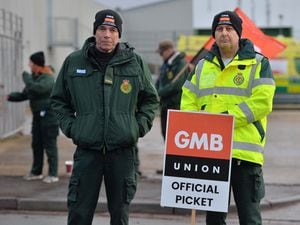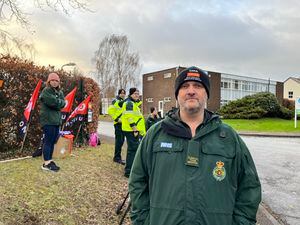Paramedics 'taking overtime to afford bills' as workers take fifth day of strike action
Life-saving emergency workers told how they're having to take overtime to afford bills on their fifth day of strike action.

Ambulance workers gathered at hubs in Shrewsbury and Donnington for their latest picket.
Colleagues told how experienced staff are leaving in their droves, with remaining workers forced to pick up the extra responsibility.
Meanwhile, they are attending traumatic road crashes, trying to save people who've had heart attacks and are witnessing elderly patients deteriorate due to not being able to afford the cost of living.
Around 10 paramedics gathered at the roadside near the Mercian Close hub in Shrewsbury in their uniform, holding up flags and picket signs.
Many commuters and parents on the school runs beeped their horns in support, while some stopped off to give them snacks and coffees to keep them going. The action began at 6am today and runs until 8am tomorrow.
Shrewsbury-based paramedic Steve Morris, who has been doing the job for seven years, laid bare the struggles facing workers.
"I'm having to take overtime to afford to pay the bills. The cost of living is really affecting us.

"That then affects your down time. We work in an extraordinary job, where we are attending RTCs, cardiac arrests, and we're seeing the elderly struggling with the cost of living and the affect that's having on their health.
"We take that home with us and it affects you. My partner is a paramedic too. The overtime affects the time we can spend with our kids. You need that time to decompress. It is hard."
Simon Day, union branch secretary for the West Midlands and a paramedic clinical team mentor in Shrewsbury, said: "We're on strike as a challenge to the government because we realise and we want them to realise that pay structures within the NHS seriously affect patients because they affect recruitment and retention of staff.
"The support has been amazing as it has been on the previous four days of action. People have been waving, beeping, bringing chocolates, coffees and sweets as a gesture of support.
"The public do often pass and stop and talk to us about the ambulance service and their gratitude that they have, and the fact that they stand by us and recognise that we are fighting for them, not just for ourselves and our own pay.
"Unfortunately there is a distinct frustration amongst our members. We've seen the news of the fire service union being offered a significant pay rise, bus workers getting 18 per cent.
"We're seeing people who have perhaps more considerate employers than the government giving them very significant pay rises and yet the government won't talk to us.
"I'm both frustrated and fearful because what happens next? How do our members take action in such a way that encourages the government to speak to us?
"I fear for what that means for patients and, not wanting patients to come to harm, I encourage the government to sit down with us now to talk to us meaningfully about pay."
Ambulance workers have rejected a four per cent pay rise that union bosses have called a "massive real terms pay cut".
Further walkouts by both the GMB and Unite union are being planned on March 6 and March 20.
West Midlands Ambulance Service admitted the latest strike will see "fewer ambulances on the roads and fewer staff taking 999 calls" and has advised people to "please use 999 wisely and use the symptom checker at NHS 111" if they are unsure which service to use.
However, WMAS assured residents that they will still respond to emergencies.





